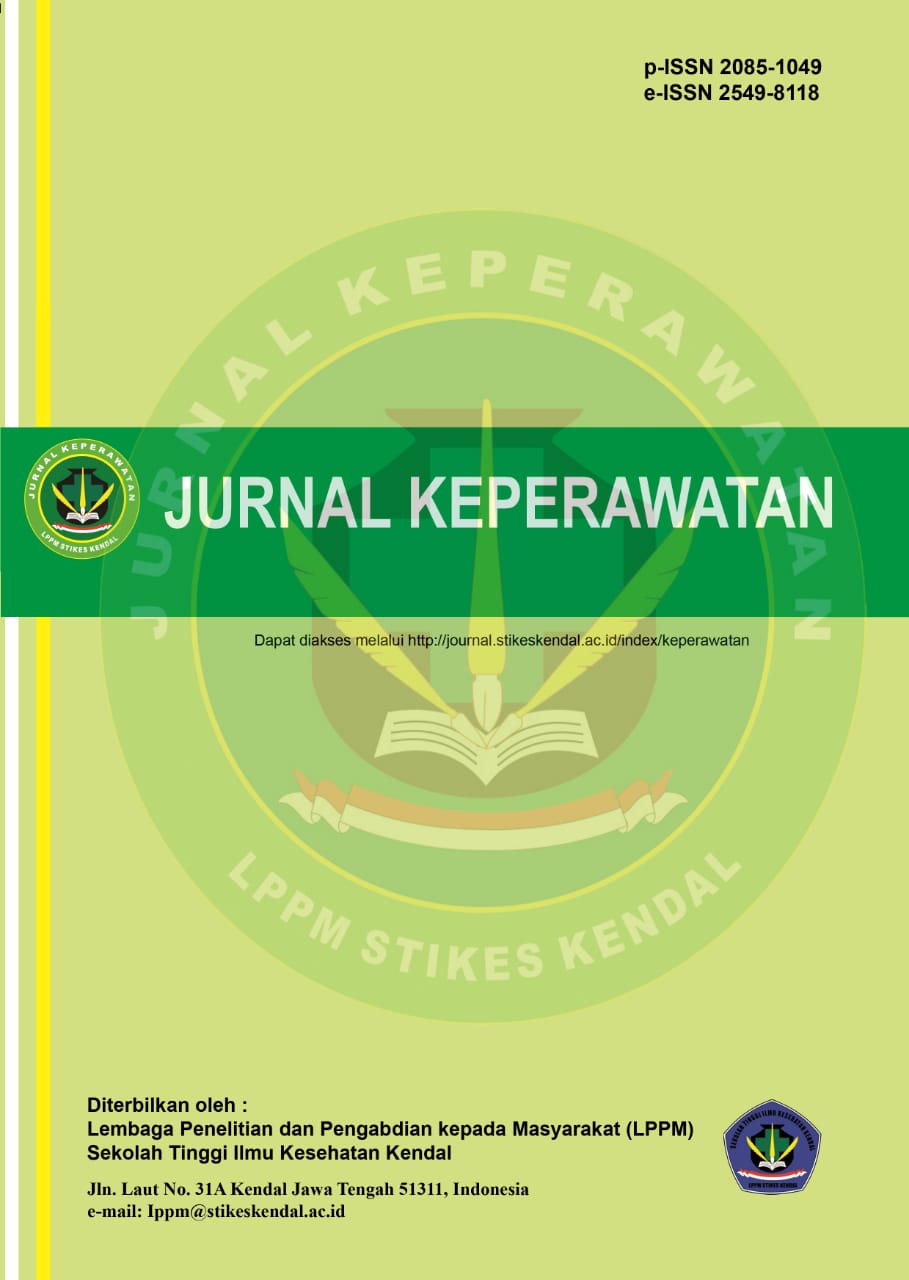Pengaruh Resiliensi terhadap Psychological Well Being pada Penderita Thalasemia
DOI:
https://doi.org/10.32583/keperawatan.v17i2.1750Keywords:
psychological well being, resiliensi, thalasemiaAbstract
Thalasemia merupakan penyakit genetik kelainan darah kronis yang memerlukan perawatan seumur hidup dan mengakibatkan efek fisik, psikologis, dan emosional yang dapat menurunkan kualitas hidup. Resiliensi dan Psychological well-being penting bagi individu karena mempunyai tujuan untuk mencapai kondisi terbaik. Penelitian ini bertujuan untuk mengetahui Pengaruh Resiliensi Terhadap Psychological Well Being Pada Penderita Thalasemia di RSU Kabupaten Sumedang. Jenis penelitian dengan deskriptif korelasional dengan jumlah responden sebanyak 78 orang penderita thalasemia. Teknik pengambilan sampel menggunakan total sampling. Alat pengumpulan data yang digunakan ialah quesioner the 14-Item Resilience Scale (RS14) untuk mengukur resiliensi dan quesioner Psychological well being scale (PWBS) untuk mengukur psychological well being. Hasil dari penelitian ini adalah resiliensi penderita thalasemia sebagian besar menunjukkan kategori sedang sebanyak 62,8% dan Psychological well being sebagian besar menunjukkan kategori sedang sebanyak 76,9%. Berdasarkan uji korelasi Gamma dan Somers’d terdapat hubungan yang sangat erat antara resiliensi dengan psychological well being pada penderita thalasemia dengan nilai korelasi 0,965 dan p= 0,00. Penelitian ini menunjukkan semakin tinggi resiliensi maka psychological well being pada penderita thalasemia semakin baik.
References
Belay, T., & Missaye, M. (2014). Risks, protection faktors and resilience among orphan and vulnerable Children (OVC) in Ethiopia: Implications for intervention. International Journal of Psychology and Counselling, 6(3), 27–31. https://doi.org/10.5897/ijpc2013.0241
Borkowski, John G. Whitman, Thomas L. Farris, J. R. (2007). No TitleAdolescent mothers and their children: Risks, resilience, and development. Lawrence Erlbaum Associates Publishers., 1–34. https://psycnet.apa.org/record/2007-07583-001
Caocci, G., Efficace, F., Ciotti, F., Roncarolo, M. G., Vacca, A., Piras, E., Littera, R., Markous, R. S. D., Collins, G. S., Ciceri, F., Mandelli, F., Marktel, S., & La Nasa, G. (2012). Health related quality of life in Middle Eastern children with beta-thalasemia. BMC Blood Disorders, 12. https://doi.org/10.1186/1471-2326-12-6
Connor, K. M., & Davidson, J. R. T. (2003). Development of a new Resilience scale: The Connor-Davidson Resilience scale (CD-RISC). Depression and Anxiety, 18(2), 76–82. https://doi.org/10.1002/da.10113
Di Fabio, A., & Palazzeschi, L. (2015). Hedonic and eudaimonic well-being: The role of resilience beyond fluid intelligence and personality traits. Frontiers in Psychology, 6(SEP), 1–7. https://doi.org/10.3389/fpsyg.2015.01367
Edriany, D., Sutatminingsih, R., & Siregar, R. H. (2021). No TitleThe Effect of Resilience and Gratitude on Psychological Well-Being of male Afghanistan refugees in Medan. International Journal of Progressive Sciences and Technologies, 24(1), 163–166.
Harms, B. P. D., Brady, L., & Wood, D. (2018). Resilience and Well-Being Abstract : 1–12.
Karen Reivich, A. S. (2022). The Resilience Faktor: 7 Essential Skills for Overcoming Life’s Inevitabel Obstacles.
Kattamis, A., Forni, G. L., Aydinok, Y., & Viprakasit, V. (2020). Changing patterns in the epidemiology of β-thalasemia. European Journal of Haematology, 105(6), 692–703. https://doi.org/10.1111/ejh.13512
Kemenkes. (2022). Thalasemia Penyakit Keturunan, Hindari dengan Deteksi Dini. https://sehatnegeriku.kemkes.go.id/baca/rilis-media/20220510/5739792/thalasemia-penyakit-keturunan-hindari-dengan-deteksi-dini/#:~:text=Berdasarkan data dari Yayasan Thalasemia,di Indonesia sebanyak 10.973 kasus
Kim, B.-M., & Shin, S.-S. (2016). Influence of Happiness and Ego-Resilience on Department Satisfaction in College Students. Indian Journal of Science and Technology, 9(43), 1–6. https://doi.org/10.17485/ijst/2016/v9i43/105041
Malkoç, A., & Yalçın, İ. (2015). Relationships among Resilience, Social Support, Coping, and Psychological Well-Being among University Students. Türk Psikolojik Danışma ve Rehberlik Dergisi, 5(43), 35–43. http://turkpdrdergisi.com/index.php/pdr/article/view/4/5
Michelle D. Keye, A. M. P. (2013). Open Journal of Social Sciences 2013. Vol.1, No.6, 1-4 Published Online November 2013 in SciRes (http://www.scirp.org/journal/jss) http://dx.doi.org/10.4236/jss.2013.16001 Open Access 1 An Investigation of the Relationship between Resilience, Mindfulness,. Published Online, 1(6), 1–4
Missasi, V., & Izzati, I. D. C. (2019). Faktor – faktor yang Mempengaruhi Resiliensi. Prosiding Seminar Nasional Magister Psikologi Universitas Ahmad Dahlan, 2009, 433–441. http://www.seminar.uad.ac.id/index.php/snmpuad/article/view/3455
Panchal, S., Mukherjee, S., & Kumar, U. (2016). Optimism in relation to well-being, resilience, and perceived stress. International Journal of Education and Psychological Research, 5(2), 1–6.
Rachmayani, D., & Ramdhani, N. (2014). Language and Cultural Adaptation Psychological Well-Being Scale. Proceeding Seminar Nasional Psikometri, 253–268.
Ryff, C. D. (1989). Happiness is everything, or is it? Explorations on the meaning of psychological well-being. Ournal of Personality and Social Psychology, 57(6), 1069–1081. https://doi.org/10.1037/0022-3514.57.6.1069
Ryff, C. D. (2015). Psychological Well-being Revisited: Advances in Science and Practice. Psychother Psychosom, 83(1), 10–28. https://doi.org/10.1159/000353263.Psychological
Ryff, C. D., & Keyes, C. L. M. (1995). The Structure of Psychological Well-Being Revisited. Journal of Personality and Social Psychology, 69(4), 719–727. https://doi.org/10.1037/0022-3514.69.4.719
Sagone, E., & Elvira De Caroli, M. (2014). A Correlational Study on Dispositional Resilience, Psychological Well-being, and Coping Strategies in University Students. American Journal of Educational Research, 2(7), 463–471. https://doi.org/10.12691/education-2-7-5
Saputri, N. R., & Mulawarman. (2022). Resiliensi Sebagai Prediktor Kesejahteraan Psikologis Remaja di Panti Asuhan. JBKI Jurnal Bimbingan Dan Konseling Indonesia, 7(2), 2615–1170.
Sood, S. A. S. (2021). Resilience and Psychological Well-Being of Higher Education Students During COVID-19: The Mediating Role of Perceived Distress. Journal of Health Management, 22(1). https://doi.org/:10.1177/0972063420983111
Tugade, M. M., & Fredrickson, B. L. (2004). Resilient Individuals Use Positive Emotions. Journal Pers Social Psychology, 86(2), 320–333. https://doi.org/10.1037/0022-3514.86.2.320.Resilient
Vazquez, C., Hervas, G., Rahona, J. J., & Gomez, D. (2009). Psychological Well-Being and Health. Contribution of Positive Psychology. Annuary of Clinical and Health Psychology, 5, 15–27.
Vinayak, S., & Judge, J. (2018). Resilience and Empathy as Predictors of Psychological Wellbeing among Adolescents. International Journal of Health Sciences & Research (Www.Ijhsr.Org), 8(April), 192. www.ijhsr.org
Wagnild, Gail M. Young, H. M. (1993). Development and psychometric evaluation of the Resilience Scale. American Psychological Association, 1(2), 165–178. https://psycnet.apa.org/record/1996-05738-006
Downloads
Published
How to Cite
Issue
Section
License
Copyright (c) 2024 Jurnal Keperawatan

This work is licensed under a Creative Commons Attribution-NonCommercial-NoDerivatives 4.0 International License.




